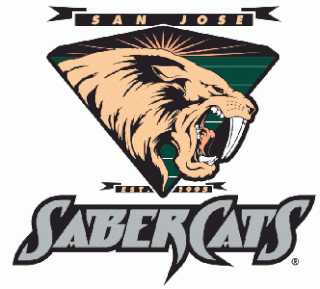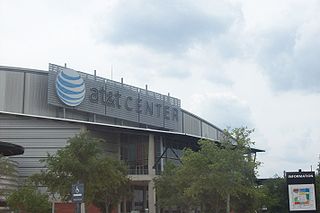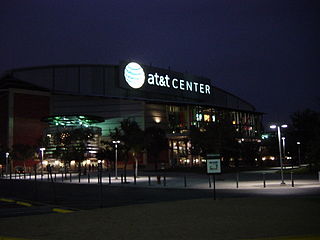Related Research Articles

The Arena Football League (AFL) was a professional arena football league in the United States. It was founded in 1986, but played its first official games in 1987 season making it the third longest-running professional football league in North America after the Canadian Football League (CFL) and the National Football League (NFL) until the AFL closed in 2019.
The AF2 was the Arena Football League's developmental league; it was founded in 1999 and played its first season in 2000. Like its parent AFL, the AF2 played using the same arena football rules and style of play. League seasons ran from April through July with the postseason and ArenaCup championship in August. The AF2 continued to operate while the AFL suspended operations for its 2009 season. The league was effectively disbanded in September 2009 when no team committed to playing in 2010, but several of the stronger franchises transferred into the reconstituted AFL.

The New Orleans VooDoo were a professional arena football team based in New Orleans, Louisiana. The VooDoo were a member of the East Division of the American Conference of the Arena Football League (AFL). They played their home games in Smoothie King Center. The VooDoo were unrelated to an earlier AFL team, the New Orleans Night, who had competed in the 1991 and 1992 AFL seasons in the Louisiana Superdome.
The San Antonio Force were a professional arena football team based in San Antonio, Texas. The team was a member of the Arena Football League that competed in the 1992 season only. The team owner of the Force was Red McCombs. The team's colors were black, red and silver.

The San Jose SaberCats were a professional arena football team based in San Jose, California. The SaberCats had been members of the Arena Football League (AFL) since 1995 ; and until 2015, they belonged to the AFL's National Conference. Over nineteen seasons of play, the SaberCats emerged as one of the Arena Football League's most successful franchises; at the conclusion of the 2015 season, the SaberCats boasted a lifetime regular season record of 198–98. Moreover, the SaberCats had won a total of four AFL Championships. Their lifetime postseason record stood at 19–12.

The AT&T Center is a multi-purpose indoor arena on the east side of San Antonio, Texas, United States. It is the home of the San Antonio Spurs of the National Basketball Association.

The Alamodome is a 64,000-seat domed indoor multi-purpose stadium in San Antonio, Texas. It is located on the southeastern fringe of downtown San Antonio. The facility opened on May 15, 1993, having been constructed at a cost of $186 million.
HemisFair Arena was an indoor arena located in San Antonio, Texas. It was home to the ABA/NBA's San Antonio Spurs from 1973 to 1993 and the San Antonio Force of the AFL during the 1992 season, their only year of existence. The Houston Rockets also played home games at the arena during the 1972-73 NBA season.
Aaron Garcia is a former professional American football quarterback who played 19 seasons in the Arena Football League (AFL), from 1995 to 2014. He played college football at Washington State University before transferring to California State University, Sacramento. After retiring from the AFL, Garcia was named the head coach of the Las Vegas Outlaws in September 2014, and was formally introduced as the head coach of the Outlaws on October 11, 2014. Garcia is married to Bryn Garcia and has five children, Gigi, Bella, Anthony, Christian, and Jaxon.

The San Antonio Talons were a professional arena football team based in San Antonio, Texas. They played in the Arena Football League (AFL). Their home arena was the Alamodome, following their relocation to San Antonio for the 2012 season.
The Pacific Division, formerly the Central Division, was a division in the Arena Football League. The division was part of both the American and National Conferences at different points in its history. The division was first formed in 1995 when expansion teams were formed and put into the current divisions.

Sports in San Antonio includes a number of professional major and minor league sports teams. The American city of San Antonio, Texas also has college, high school, and other amateur or semi-pro sports teams.
The 2011 Tulsa Talons season was the 12th season for the franchise, and the second in the Arena Football League. The team was coached by Mitch Allner and played their home games at BOK Center. The Talons finished the season 8–10, failing to qualify for the playoffs. This would be the last season for the Talons in Tulsa, Oklahoma. The franchise relocated to San Antonio, Texas following this season.

The 2012 Arena Football League season was the 25th season in the history of the league. The regular season began on March 9, 2012 with a game between the Pittsburgh Power and the Orlando Predators and ended on July 22, 2012 with a game between the Utah Blaze and Philadelphia Soul. The Arizona Rattlers defeated the Philadelphia Soul by a 72–54 score in ArenaBowl XXV on August 10, 2012 to conclude the playoffs.
The 2012 San Antonio Talons season was the 12th season for the franchise, and the third in the Arena Football League. This was the first season for the Talons in San Antonio, Texas after relocating from Tulsa, Oklahoma following the 2011 season. The team was coached by Lee Johnson and played their home games at the Alamodome. The Talons finished the regular season with a 14–4 record, winning the Central Division and securing the top seed in the National Conference. However, the Talons would lose at home by one point in the conference semifinals to the Utah Blaze, 34–35.
The 2013 San Antonio Talons season was the 13th season for the franchise, the fourth in the Arena Football League, and the second in San Antonio, Texas. The team was coached by Lee Johnson and played their home games at the Alamodome. Finishing the season with a 10–8 record, the Talons missed the playoffs by losing a tiebreaker with the Chicago Rush. They also finished the season with 9 different quarterbacks, 6 of them getting injured.
Lee Johnson is an arena football coach and former offensive lineman and defensive lineman. He played his college football at the University of Missouri, and was an AFL offensive lineman and defensive lineman from 1995 to 1996. He has been a football coach since 1997. After being the defensive coordinator for the Orlando Predators from 2010 to 2011, he became the San Antonio Talons head coach in 2011.
The 2014 San Antonio Talons season was the 14th season for the franchise, the fifth in the Arena Football League, and the third in San Antonio, Texas. The team was coached by Lee Johnson and played their home games at the Alamodome. Finishing the regular season with a 3–15 record, this was the worst season in franchise history.
Anthony Buich is a former American football quarterback who played one season with the Grand Rapids Rampage of the Arena Football League (AFL). He played college football at Eastern Illinois University. He was also a member of the Iowa Barnstormers, Tulsa Talons, Tampa Bay Storm, Wichita Stealth, Nashville Kats and San Diego Riptide.
References
- ↑ Richard Oliver (June 30, 2011). "Arena football may find home in S.A." San Antonio Express-News . Hearst Communications Inc. Retrieved March 27, 2013.
- ↑ Richard Oliver (June 17, 2012). "Force's 50-0 loss 20 years ago stands alone". San Antonio Express-News. Hearst Communications Inc. Retrieved March 26, 2013.
- ↑ Mike Wagner (November 6, 1992). "Force.Folding Force will no longer be with San Antonio". San Antonio Express-News. Retrieved March 27, 2013.
- ↑ Roy Hasty (January 29, 1993). "No Arena team for Hartford Verdict on Arena team: risk of loss too high". Hartford Courant . Retrieved March 27, 2013.
- ↑ Charlie Hannema (September 21, 2011). "Tulsa Talons Moving To San Antonio". www.newson6.com. NowWorld. Retrieved March 27, 2013.
- ↑ Charlie Hannema (September 21, 2011). "Tulsa Talons Moving To San Antonio". www.newson6.com. World Now. Retrieved May 19, 2013.
- ↑ W. Scott Bailey (March 2, 2012). "Local real estate firm Lynd unveils sports-business unit". www.bizjournals.com. American City Business Journals. Retrieved May 19, 2013.
- ↑ Richard Oliver (March 9, 2012). "With strike in place, new Talons team may play today". San Antonio Express-News. The Hearst Corporation. Retrieved September 24, 2013.
- ↑ Eric R. Ivie. "San Antonio Talons sign Aaron Garcia, Robert Quiroga". www.sports.yahoo.com. Yahoo!. Retrieved September 24, 2013.
- ↑ Joe Conger (December 10, 2013). "SA Talons owner sued for breach of contract". www.kens5.com. KENS 5-TV, Inc. Archived from the original on January 9, 2014. Retrieved January 9, 2014.
- ↑ Patrick Danner (January 9, 2014). "Arena Football League takes over Talons". www.expressnews.com. The Hearst Corporation. Retrieved January 9, 2014.
- ↑ AFL Talons won’t play in San Antonio next season, former team executive says, W. Scott Bailey, San Antonio Business Journal, October 13, 2014